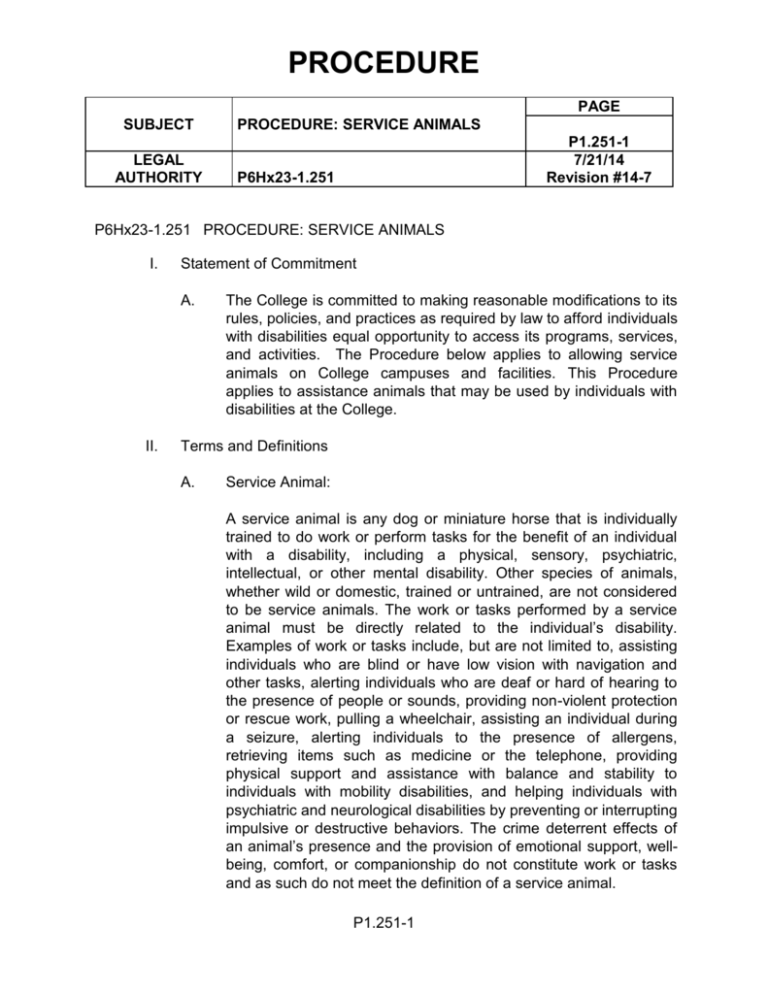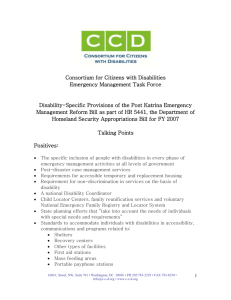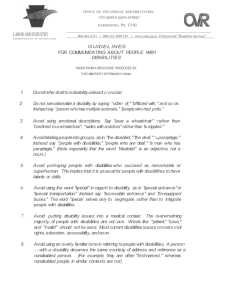Procedure
advertisement

PROCEDURE PAGE SUBJECT LEGAL AUTHORITY PROCEDURE: SERVICE ANIMALS P1.251-1 7/21/14 Revision #14-7 P6Hx23-1.251 P6Hx23-1.251 PROCEDURE: SERVICE ANIMALS I. Statement of Commitment A. II. The College is committed to making reasonable modifications to its rules, policies, and practices as required by law to afford individuals with disabilities equal opportunity to access its programs, services, and activities. The Procedure below applies to allowing service animals on College campuses and facilities. This Procedure applies to assistance animals that may be used by individuals with disabilities at the College. Terms and Definitions A. Service Animal: A service animal is any dog or miniature horse that is individually trained to do work or perform tasks for the benefit of an individual with a disability, including a physical, sensory, psychiatric, intellectual, or other mental disability. Other species of animals, whether wild or domestic, trained or untrained, are not considered to be service animals. The work or tasks performed by a service animal must be directly related to the individual’s disability. Examples of work or tasks include, but are not limited to, assisting individuals who are blind or have low vision with navigation and other tasks, alerting individuals who are deaf or hard of hearing to the presence of people or sounds, providing non-violent protection or rescue work, pulling a wheelchair, assisting an individual during a seizure, alerting individuals to the presence of allergens, retrieving items such as medicine or the telephone, providing physical support and assistance with balance and stability to individuals with mobility disabilities, and helping individuals with psychiatric and neurological disabilities by preventing or interrupting impulsive or destructive behaviors. The crime deterrent effects of an animal’s presence and the provision of emotional support, wellbeing, comfort, or companionship do not constitute work or tasks and as such do not meet the definition of a service animal. P1.251-1 PROCEDURE PAGE SUBJECT LEGAL AUTHORITY B. PROCEDURE: SERVICE ANIMALS P1.251-2 7/21/14 Revision #14-7 P6Hx23-1.251 Support Animals: A support animal is an animal that provides emotional or other support that ameliorates one or more identified symptoms or effects of a person's disability. Unlike service animals, support animals are not required to be trained to perform work or tasks, and they include species other than dogs and miniature horses. Support animals are not allowed on the College campuses. C. Pets: A pet is any animal kept for ordinary use and companionship. Pets are generally prohibited on the College campuses. III. Trainee of Service Animals Florida law allows animals on campus that are being trained to be service animals. IV. Allowable Access Individuals with disabilities shall be permitted to be accompanied by their service animals in all areas of the College or outside the College when the student is participating in an offsite college-sponsored activity where members of the public, program participants, clients, customers, patrons, or invitees are allowed to go. If a service animal’s presence in a specific facility compromises legitimate safety requirements that are necessary for safe operation, they can be excluded from the facility (e.g., from a surgery or intensive care unit in a hospital in which a sterile field is required.) College staff may ask an individual with a disability to remove a service animal from the premises if the animal is not housebroken or if the animal is out of control and the individual does not take effective action to control it. An individual shall use a harness, leash or other tether with their service animal unless either the individual is unable to do so because of a disability or unless the use of a harness, leash, or other tether would interfere with the service animal’s safe, effective performance of work or tasks. In these cases, the service animal must be under the individual’s control through voice control, signals, or other effective means. If a service animal is excluded, the individual with a disability must still be P1.251-2 PROCEDURE PAGE SUBJECT LEGAL AUTHORITY PROCEDURE: SERVICE ANIMALS P1.251-3 7/21/14 Revision #14-7 P6Hx23-1.251 offered the opportunity to obtain goods, services, and accommodations without having the service animal on the premises. V. Responsibilities A. Faculty and Staff: To ensure equal access and nondiscrimination of individuals with disabilities, members of the College’s community must abide by the following practices: 1. Allow service animals to accompany individuals with disabilities on campus; 2. Do not ask for details about a person's disabilities; 3. Do not pet a service animal, as it distracts the animal from its work; 4. Do not feed a service animal; 5. Do not deliberately startle, tease, or taunt a service animal; and 6. Do not separate or attempt to separate a person from his/her service animal unless the animal is not housebroken or if the animal is out of control and the individual does not take effective action to control it. 7. Do not ask about the nature or extent of a person's disability to determine whether a person's animal qualifies as a service animal. However, when it is not readily apparent that it is a service animal, College staff may make two inquiries to determine whether the animal qualifies as a service animal, which are: a. Is the animal required because of a disability? b. What work or task has the animal been trained to perform? P1.251-3 PROCEDURE PAGE SUBJECT LEGAL AUTHORITY B. C. PROCEDURE: SERVICE ANIMALS P1.251-4 7/21/14 Revision #14-7 P6Hx23-1.251 Other Provisions: 1. The College is not responsible for the care and supervision of a service animal. 2. Depending on the nature of the damage, if the College normally charges individuals for the damage they cause, an individual with a disability may be charged for damage caused by his or her service animal. 3. The College does not require documentation, such as proof that the animal has been certified, trained, or licensed as a service animal. Individuals accompanied by a service animal on campus but who do not need any disability-related accommodations are not required to register with Disability Resources. 4. A service animal must be housebroken (i.e., trained so that it controls its waste elimination, absent illness or accident) and must be kept under control by a harness, leash, or other tether, unless the person is unable to hold those, or such use would interfere with the service animal's performance of work or tasks. In such instances, the service animal must be kept under control by voice, signals, or other effective means. Students Using Service Animals: The College is not responsible for the care or supervision of service animals. Individuals with disabilities are responsible for the cost, care, and supervision of service animals, including: 1. Compliance with any laws pertaining to animal licensing, vaccination, and owner identification; 2. Keeping the animal under control and taking effective action when it is out of control; and P1.251-4 PROCEDURE PAGE SUBJECT LEGAL AUTHORITY PROCEDURE: SERVICE ANIMALS P1.251-5 7/21/14 Revision #14-7 P6Hx23-1.251 3. Feeding and walking the service animal, and disposing of its waste. Students with disabilities who are accompanied by animals must comply with the same rules regarding noise, safety, disruption, and cleanliness as students without disabilities. History: Adopted – 7/21/14. Effective – 7/21/14. P1.251-5






